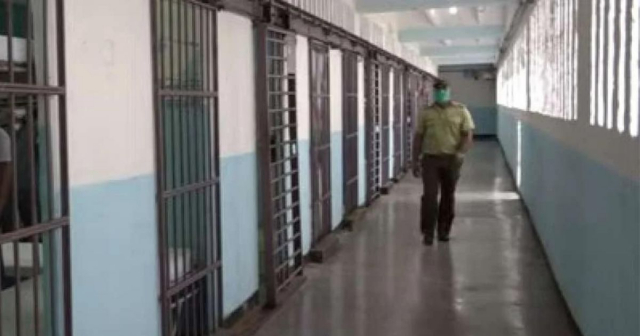Wilber Aguilera Bravo, father of the political prisonerWalniel Luis Aguilar Rivera, delivered to the Cuban authorities an official petition for an Amnesty Law signed by other relatives ofconvicted for political reasons.
The renowned member of theCuban civil society appeared this Friday morning before theNational Assembly of People's Power (ANPP) to deliver the document, supported by the signature of 34 relatives of political prisoners.
“I have just delivered the Amnesty Letter that the family members signed to [demand the release of] our political prisoners. It has just been delivered right now in Parliament successfully. This is one of the eight legal ways; Let's hope that this reaches where it needs to go and leads to the freedom of our political prisoners. Homeland, life and freedom. A hug,” the father of the protester said in a direct message.historic 11J protests in Cuba.
The petition, which is open for signature by all Cuban citizens, is supported by article 61 of the 2019 constitutional text, which recognizes the right of citizens to present petitions to state officials and institutions, who are theoretically obliged to respond to them.
Beyond its legal effectiveness, the petition has a clear political objective: to maintain pressure on the Cuban authorities and encourage discussion around the release of hundreds of political prisoners on the island, he stressed.ElTOQUE in a long thread published on their social networks.
Recently, theInter-American Commission on Human Rights (IACHR) sent the Cuban authorities a document prepared by theCuban Observatory of Human Rights (OCDH). This document includes a catalog of legal solutions, among which amnesty stood out, as a mechanism to free political prisoners.
The amnesty, as established in article 61 of the 2019 Constitution, is a legal institution that can only be ordered by the ANPP. This measure implies not only forgiveness, but also "forgetting" the situation that preceded the penalty.Unlike a pardon, an amnesty produces the immediate cancellation of all criminal records related to the events it covers..
Before this proposal led by relatives of political prisoners, Cuban civil society explored similar avenues through the popular legislative initiative, which allows 10,000 citizens to collect signatures to promote a specific law.
However,previous proposals led by activists and opposition platforms They were not presented to the ANPP, being criticized by a sector that considers that asking for amnesty legitimizes the Cuban regime and recognizes non-existent guilt.
However, the defenders of other front lines of demanding rights from the Cuban dictatorship have not achieved, according to the aforementioned media, the massive and unconditional release of the majority of political prisoners who still remain in Cuban prisons.
In this sense, the civil society amnesty petition presented to the ANPP seeks to open a space for dialogue and pressure to address concrete solutions to this sensitive issue in Cuba.
CyberCubareproduces the full text of the Amnesty Letter
Honorable Representative Ana María Mari Machado:
The State courts have condemned hundreds of Cuban citizens for expressing the will to live in a free and democratic country where the independence of powers, the rule of law, plurality and political participation are guaranteed.
Having exhausted all legal avenues to demand justice for the Cubans imprisoned for expressing their desire for democracy in a country where independent advocacy is prohibited, we turn to you, so that as a representative you can initiate the corresponding procedures in the National Assembly for drafting and debate, in order to approve aAmnesty Law in accordance with the procedures of the law.
This means,the recognition that there was NO crime in expressing the will for democratic change that citizens expressed in the protests of July 2021, as well as in the collective and individual protests that preceded and continued this historic date, and that are part of a cycle broader that has freedom, human rights and democracy as its common claim.
Law No. 131/2019 on the Organization and Functioning of the National Assembly of People's Power and the Council of State of the Republic of Cuba grants deputies the power to propose bills, and us the right to present petitions, although To this day no deputy has ever done so.
The relatives of the political prisoners, and the Cuban citizens who accompany this request, suffer persecution and harassment by State security, the police and intelligence agencies, as punishment for advocating for the release of our families. We are prevented from having the right to peaceful association and assembly, as well as the right to freedom of expression and opinion through arbitrary arrests, interrogations, criminal investigation procedures, warning letters, methods of systematic surveillance and violations of freedom of expression. motion.
Beyond these behaviors that violate human rights, we will continue defending those who should not have spent a single day in prison. In the years to come, it will not be possible to say that Cuban citizens do not ask and fight in every way for Amnesty for those unjustly convicted. If you do not take sides on the right side of history at this key hour, silence, complicity, cowardice and obstruction of the legitimate aspirations for democratic change of the majority of Cubans will be yours.
We look forward to your response.
What do you think?
COMMENTFiled in:
